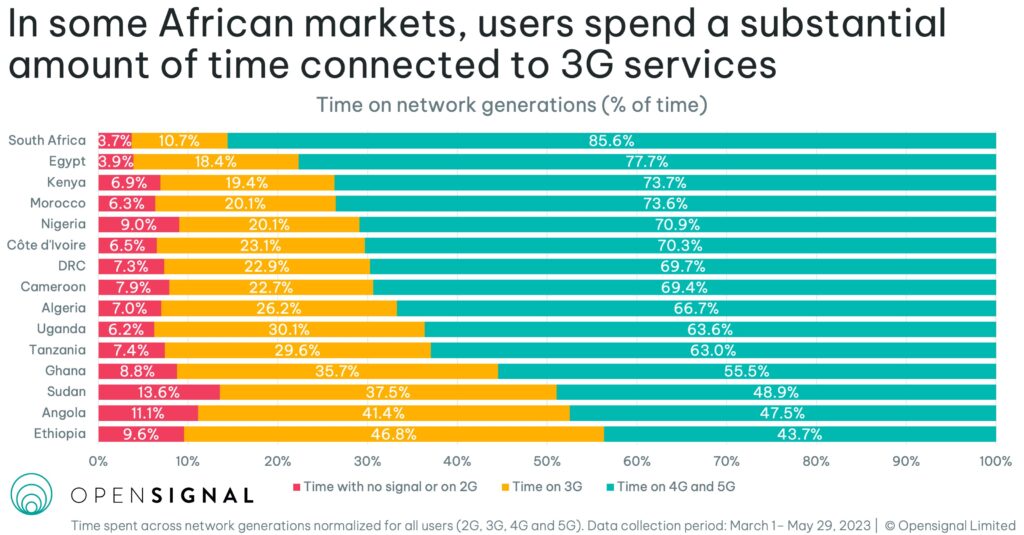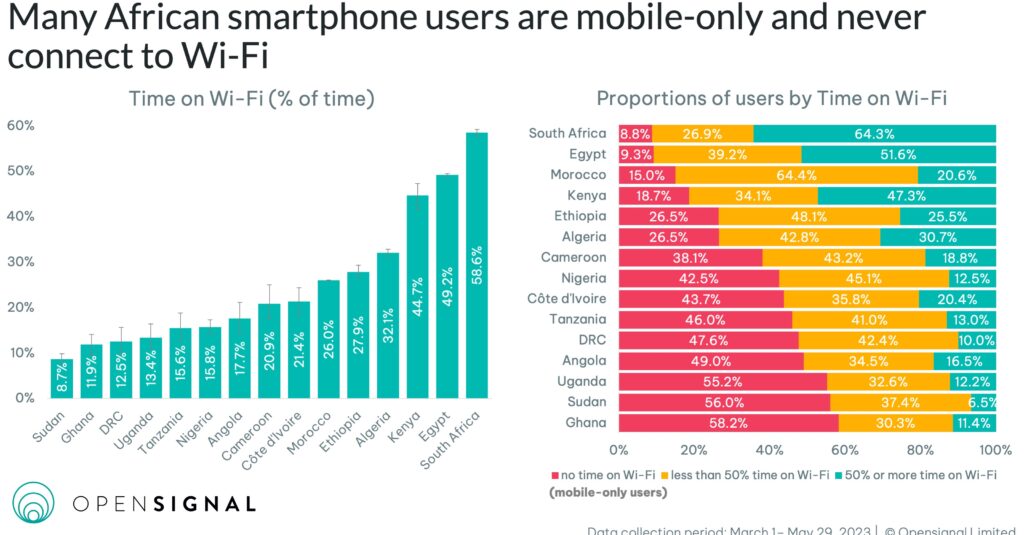Lack of fixed infrastructure means mobile data rules with wi-fi only sporadically used
Smartphone users across the African continent are faced with slower speeds and a worse user experience because they are having to spend a large proportion of time connected to older network generations — like 3G, or even 2G.
Analysts Opensignal looked at the experience of smartphone users across the 15 markets in Africa with the highest numbers of unique mobile subscribers, according to GSMA Intelligence. It found that smartphone users in Ethiopia and Angola where mobile experience scores tend to be low spend more than 40% of their time connected to 3G services. By contrast, users in Uganda, Ghana, and Sudan — more than 30% of the time.
Limited spectrum bandwidth, together with heavy use of 3G connectivity and lower maximum data transfer rates adversely affects the quality of the overall mobile network experience in African markets. Smartphone users spend more than 5% of their time connected to 2G in Angola, Ethiopia, Ghana, Nigeria, Sudan, and Tanzania.

However, in South Africa and Morocco, users spend just 1.9-2% of their time on 2G. Opensignal said smartphone users in Sudan, Morocco, Angola, and Cameroon spend the highest proportion of time with no signal among African markets, ranging from 3.3 to 4.9% of the time, which makes connecting to mobile services even more challenging.
The numbers are not surprising given how older and simpler mobile devices are the norm in many countries.
In Ethiopia, Angola, and Sudan smartphone users connect to 4G services for less than half of the time. At the other end of the scale, South Africa is the leader in terms of time our smartphone users spend connected to 4G or better services — 85.6% of the time, 7.9 percentage points ahead of Egypt, and around twice as often as those in Ethiopia which only recently liberalised its mobile market.
Majority never connect to wi-fi
For many internet users worldwide, especially in low and middle-income markets, mobile connectivity is the main, and often only, means of access. Opensignal data demonstrates that in many African markets, users connect to wi-fi services very sporadically — smartphone users spend only 8.7% of their time on wi-fi in Sudan, 11.9% in Ghana, and 12.5% in the Democratic Republic of the Congo.

On the other hand, smartphone users in South Africa spend the most time on wi-fi across the observed markets (58.6%) followed by Egypt with nearly half of the time connected to wi-fi services.
Opensignal data showed a substantial share of mobile-only Internet users, who never connect to wi-fi services and rely only on mobile connectivity for data transfers. In eight out of the 15 analysed markets, more than 40% of mobile-only users never connect to wi-fi.
In three markets — Uganda, Sudan and Ghana — more than half of measured smartphone users only use mobile networks. By contrast, less than 10% of smartphone users in South Africa or Egypt only use mobile connectivity.
General mobile experience
Opensignal users in South Africa enjoy the fastest download speeds (27.3Mbps) and the most consistent quality of mobile services in Africa, while also connecting to 4G and 5G services for the highest proportion of time. Egypt and Kenya are in a statistical tie for third place, with scores of 16.2-16.3Mbps. Meanwhile, Morocco leads for upload speed experience (7.5Mbps), games experience, and voice app experience.
Smartphone users in South Africa understandably enjoy the most consistent mobile network experience in Africa, as the market leads with an Opensignal score of 50.9%. This is 4.9 percentage points ahead of second-placed Egypt and 5.6 percentage points ahead of third-placed Morocco.
These scores reflect the percentage of tests in which Opensignal’s smartphone users’ experience on a network is sufficient to support the requirements of more common demanding applications, such as video calling, uploading an image to social media, or using smart home applications.
In Ghana, Sudan, and Côte d’Ivoire, the percentage of successful tests was below 10%, with Ethiopia and Cameroon scoring as low as 0.1%. These relatively low scores are likely due to the high usage of old 3G technology in those markets.
5G will change the mobile experience
At the moment, the presence of 5G connectivity is poor on the continent, with only South Africa having a more substantial number of 5G subscriptions, while others observe only several thousand of 5G users. Opensignal concludes the road to ubiquitous 5G in Africa is likely to be a long one, as access to 4G is still not universal and many users still rely on 2G and 3G networks to connect to the mobile internet.


